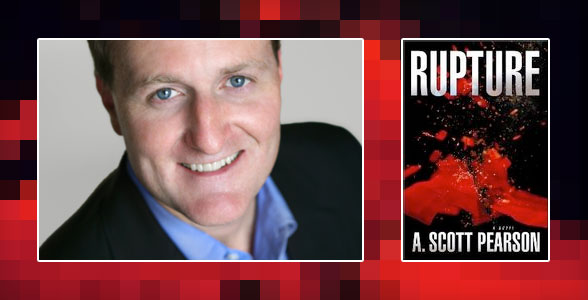By Scott Pearson
One year ago, with the publication of my first novel, a medical thriller titled Rupture, I entered the transformative process from physician to physician–author. In truth, this process began years ago, a decade in fact, when I started grabbing a few minutes here and there to put words to paper. That is, after all, the essence of being an author—putting words on the page, preferably in complete sentences, then paragraphs, chapters, and eventually a full manuscript that tells the story that’s been floating around in one’s head. In case that sounds glamorous, it’s not. It’s the culmination of years filled with false starts, procrastination, deleted files, rejection letters, and hours spent in bookstores gazing at the success of other authors. But that’s all behind me now—until I start another book. Then it’s rewind, start from the beginning.
The beginning takes us back to 2002. Those pages had piled into a thick manuscript I was sick of reading. I needed a critical eye. To fulfill that need, I returned to my days at UT Knoxville and called my former English professor, Penny Tschantz, with whom I had had no contact since my graduation in 1987. Fortunately for me, she agreed to read my work and thus recommenced our student–mentor relationship, a relationship that persists to this day.
The physician–author tag is not a new or unique one. You know several doctor writers already, starting with Sir Arthur Conan Doyle of Sherlock Holmes fame. You likely know of Robin Cook’s Coma (at least the movie, if not the novel), and the late Michael Crichton, creator of Jurassic Park and ER. But as I told my colleagues recently at surgery grand rounds, all physicians write daily—progress notes, referral letters, letters to insurance companies. Some of us go on to write nonfiction books on the disease of the day, our life’s story in memoir, or even fiction. Writing becomes a necessary outlet, an attempt to make sense of what we encounter day to day. I recall Stephen King, when asked why he wrote horror, replied, “What makes you think I have a choice?” I have come to appreciate that.
I became acutely aware of the ramifications of the physician–author (or more precisely, surgeon–author) tag at my first book signing for Rupture. A potential customer picked up my book, flipped to the back cover, raised his eyebrows, and asked, “So, you’re a doctor?”
Me: Yes.
Him: What kind?
Me: I’m a surgeon.
Him: Really?
At this point, I felt the physician–author role follow a misdirected path.
Him again: I had surgery recently.
Me: (trying to pull these words back) What kind?
My potential reader then turned his back toward me and proceeded to raise his shirttail and pull down his belt (to the intrigue and dismay of the other potential readers around my table) to reveal a very low scar from his back operation. After I complimented him on what a splendid wound healer he was, he was satisfied and went elsewhere, without buying a book.
I’m learning that the title physician–author has connotations beyond mere book promotion. I’ve got a new plan for my next book tour: free scar examination with each copy sold.
– – –
Pearson (Knoxville ’87, HSC ’91) is a member of the surgical faculty at Vanderbilt University in Nashville. He recently spoke with students and had a book signing as part of UT Knoxville’s Accomplished Alumni Program.



